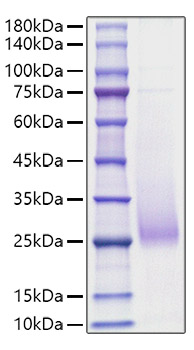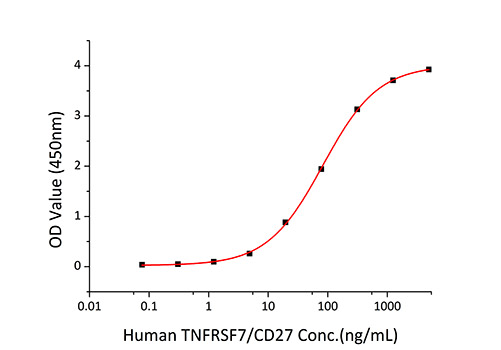Description
Recombinant Human TNFSF7/CD27 Ligand/CD70 Protein
The Recombinant Human TNFSF7/CD27 Ligand/CD70 Protein is a biologically active recombinant protein that plays a significant role in various cellular processes and signaling pathways in human biology. This protein is widely employed in immunological research, cell biology studies, protein-protein interaction analyses, and therapeutic development, providing researchers with a reliable tool for investigating TNFSF7/CD27 Ligand/CD70 function and its implications in health and disease.
This product (SKU: RPCB1073) is produced using HEK293 cells and features a N-6His tag for convenient detection and purification. The protein exhibits a calculated molecular weight of 17.98 kDa with an observed molecular weight of 25 kDa under denaturing conditions, achieving ≥ 95 % as determined by SDS-PAGE.. Functional bioactivity has been validated through rigorous quality control assays, confirming its suitability for demanding research applications.
Key Features
| High Purity by Affinity Chromatography | |
| Mammalian & Bacterial Expression Systems | |
| High lot-to-lot consistency via strict QC |
| Product Name: | Recombinant Human TNFSF7/CD27 Ligand/CD70 Protein |
| SKU: | RPCB1073 |
| Size: | 10 μg , 20 μg |
| Reactivity: | Human |
| Synonyms: | CD27L, LPFS3, CD27-L, CD27LG, TNFSF7, TNLG8A, CD70 |
| Tag: | N-6His |
| Expression Host: | HEK293 cells |
| Calculated MW: | 17.98 kDa |
| Observed MW: | 25 kDa |
| Gene ID: | 970 |
| Protein Description: | High quality, high purity and low endotoxin recombinant Recombinant Human TNFSF7/CD27 Ligand/CD70 Protein (RPCB1073), tested reactivity in HEK293 cells and has been validated in SDS-PAGE.100% guaranteed. |
| Endotoxin: | < 1 EU/μg of the protein by LAL method. |
| Purity: | ≥ 95 % as determined by SDS-PAGE. |
| Formulation: | Lyophilized from a 0.22 μm filtered solution of PBS, pH 7.4. |
| Bio-Activity: | Measured by its binding ability in a functional ELISA.Immobilized Human TNFSF7 (RPCB1073) at 2 μg/mL (100 μL/well) can bind Human TNFRSF7 (RPCB0898) with a linear range of 0.2-82 ng/mL. |
| Reconstitution: | Centrifuge the vial before opening. Reconstitute to a concentration of 0.1-0.5 mg/mL in sterile distilled water. Avoid vortex or vigorously pipetting the protein. For long term storage, it is recommended to add a carrier protein or stablizer (e.g. 0.1% BSA, 5% HSA, 10% FBS or 5% Trehalose), and aliquot the reconstituted protein solution to minimize free-thaw cycles. |
| Storage: | Store at -20℃.Store the lyophilized protein at -20℃ to -80 ℃ up to 1 year from the date of receipt. After reconstitution, the protein solution is stable at -20℃ for 3 months, at 2-8℃ for up to 1 week. |
CD70, a member of the tumor necrosis factor superfamily, is restricted to activated T-and B-lymphocytes and mature dendritic cells. Binding of CD70 to its receptor, CD27, is important in priming, effector functions, differentiation and memory formation of T-cells as well as plasma and memory B-cell generation. Tight control of CD70 expression is required to prevent lethal immunodeficiency. By selective transcription, CD70 is largely confined to activated lymphocytes and dendritic cells (DC). As a type II transmembrane receptor, CD70 is normally expressed on a subset of B, T and NK cells, where it plays a costimulatory role in immune cell activation. Immunohistochemical analysis of CD70 expression in multiple carcinoma types. The restricted expression pattern of CD70 in normal tissues and its widespread expression in various malignancies makes it an attractive target for antibody-based therapeutics. Investigations to exploit CD70 as a cancer target have lead to the identification of potential antibody-based clinical candidates.








